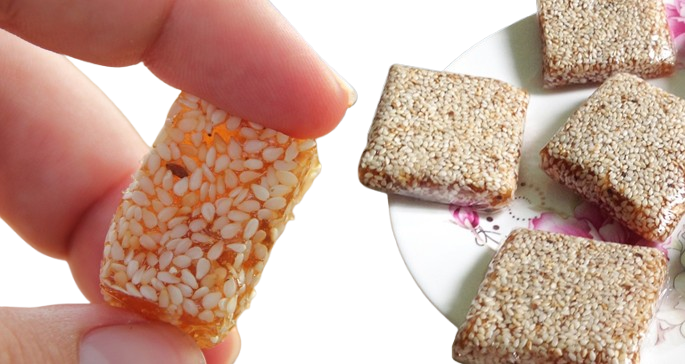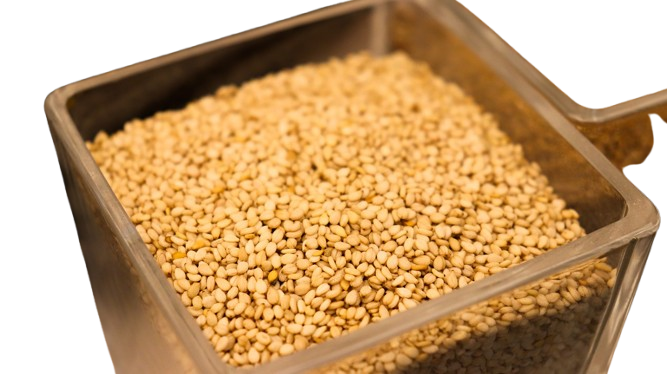Sesame seeds, one of the oldest cultivated crops, are a vital part of African and global cuisines. These nutrient-packed seeds, native to Africa and Asia, are treasured for their nutty flavor, cultural roots, and numerous health benefits.
In African cooking, sesame seeds shine in soups, stews, and snacks. In West Africa, they are ground into pastes for dishes like ogbono soup or added to roasted snacks for crunch. East African cuisine features them in sweet treats like halawa or as toppings for breads and flatbreads.
Globally, sesame seeds are equally beloved. They are essential in tahini for Middle Eastern hummus, and their nutty flavor elevates sushi, salads, and baked goods. Their adaptability and health-promoting properties make sesame seeds a timeless staple, connecting culinary traditions across the world. Whether enhancing African recipes or global favorites, sesame seeds are a small ingredient with big impact.
Related: Shea butter: Benefits and where to buy online
Sesame Seeds’ Nutritional Benefit

Small but powerful, sesame seeds provide a remarkable range of nutrients that make them an essential part of every diet. Rich in antioxidants, calcium, plant-based protein, and healthy fats, they are a veritable superfood with health advantages that are especially pertinent to African diets.
1. Packed with Good Fats
Omega-6 fatty acids and other beneficial unsaturated fats are abundant in sesame seeds. These fats are necessary to sustain brain function, keep the heart healthy, and encourage good skin. Incorporating sesame seeds into your diet can lower cholesterol, lower your risk of heart disease, and provide you with sustained energy.
2. Superior Plant-Based Proteins
Protein is essential for muscle growth, tissue healing, and general health maintenance. As an excellent plant-based source of protein, sesame seeds are a great complement to vegan and vegetarian diets. Sesame seeds are an ideal option for organically increasing protein intake for many Africans, as plant proteins frequently supplement animal-based proteins in meals.
3. Calcium for Bone Health
Calcium, a mineral vital to bone health, is abundant in sesame seeds. Sesame seeds are a great substitute for dairy in areas where lactose sensitivity is common or access to dairy may be restricted. Frequent intake promotes healthy teeth and bones, preventing diseases like osteoporosis and improving mobility in older adults.
4. Sufficient Antioxidants
Sesame seeds, which are rich in antioxidants including sesamin, sesamol, and sesamolin, help the body fight against oxidative stress. These substances lessen inflammation, shield cells from harm, and promote general well-being. In particular, antioxidants are essential for preventing chronic conditions including diabetes, heart disease, and some forms of cancer.
5. Power for Increasing Energy
Sesame seeds are an energy-boosting wonder for people with busy schedules or those who require extra energy for hard work. They are a dependable source of long-lasting energy, ideal for anybody wishing to start their day naturally, because they contain protein, healthy fats, and vital minerals like magnesium.
6. Iron for Improved Blood Health
Sesame seeds are a great source of iron, a mineral that is essential for making red blood cells and avoiding anemia. Because of this, they are a great diet for promoting good blood circulation, particularly in African countries where anemia is still a prevalent health issue.
7. Magnesium for Healthy Heart and Nerves
Another important vitamin found in sesame seeds is magnesium, which helps to maintain a regular heartbeat, promote neuronal function, and control blood pressure. It is especially helpful for people who are trying to prevent cardiovascular problems or manage hypertension.
Relevance of Nutrition to African Diets
Sesame seeds are a nutrient-dense supplement to traditional meals for a large number of Africans. In addition to adding flavor, they provide vital nutrients to common foods like soups, stews, and porridges. While their calcium and protein content assists with general health in diets where nutritional diversity may be restricted, their energy-boosting qualities make them perfect for hardworking people.
Your body will receive a consistent supply of these vital nutrients if you include sesame seeds in your meals on a regular basis, whether they are added to snacks, blended into soups, or sprinkled over cereal. With so many advantages, this little seed is an essential component of a healthy way of living.
Related: How to Start an Online Fashion Store: A Step-by-Step Guide
Health Benefits of Sesame Seeds
Sesame seeds are not just a tasty complement to your meals; they are also a nutritional powerhouse with several health advantages. They are high in important vitamins, minerals, and bioactive substances and contribute significantly to general wellness, making them a must-have in both traditional diets and modern health-conscious lifestyles.
1. Strengthens bones.
Sesame seeds are high in calcium, phosphorus, and magnesium, all of which are essential for healthy bones and teeth. Calcium promotes bone density and helps to avoid conditions such as osteoporosis, particularly in areas where dairy consumption may be limited. Phosphorus and magnesium work together with calcium to maintain good bone health, lowering the risk of fractures and improving mobility as you age. Sesame seeds are a wonderful nutritional supplement for children and the elderly, promoting growth and long-term skeletal health.
2. Supports heart health.
Heart health is a serious concern worldwide, and sesame seeds can help preserve cardiovascular health. They are high in heart-healthy fats, such as polyunsaturated and monounsaturated fats, which help raise HDL (good cholesterol) and lower LDL (bad cholesterol). Sesame seeds also contain sesamin and sesamol, two lignans known to lower blood pressure and lower the risk of atherosclerosis. Magnesium in these seeds promotes healthy blood vessel activity and helps regulate blood pressure.
3. Promotes digestion
Fiber is needed for a healthy digestive system, and sesame seeds are high in dietary fiber. Consuming sesame seeds on a regular basis can help encourage regular bowel movements, avoid constipation, and enhance gut health. Sesame seeds’ natural oils help to maintain a healthy digestive tract, soothe inflammation, and lower the risk of gastrointestinal problems. This makes sesame seeds a great supplement to diets in areas where digestive problems may be widespread due to insufficient fiber intake.
4. Promotes glowing skin
Sesame seeds are a natural ingredient that promotes healthy, bright skin. They are high in antioxidants including sesamol and vitamin E, which fight free radical damage and prevent premature aging and dull skin. Sesame seeds’ natural oils moisturize, improve skin suppleness, and reduce dryness. Sesame seeds’ anti-inflammatory characteristics assist to relieve skin disorders like eczema and psoriasis, making them a functional diet for beauty from the inside out.
5. Supports a balanced diet.
Sesame seeds are nutrition dense, including a variety of critical vitamins and minerals that contribute to a well-balanced diet. They contain B-complex vitamins such as niacin, thiamine, and folate, which are essential for energy production and brain function. Their high protein content makes them an ideal alternative for vegetarians and others wishing to incorporate more plant-based proteins into their diet. Sesame seeds are also a natural source of zinc, which is crucial for immunological health and cellular repair, especially in areas where nutrient deficits are frequent.
6. Boosts metabolism and energy levels.
Sesame seeds are a natural energy enhancer due to their high protein, magnesium, and healthy fat content. They give a consistent release of energy, making them ideal for persons who are active or work in physically demanding jobs. Sesame seeds promote metabolic health, allowing the body to use energy more efficiently, lowering weariness and increasing overall stamina.
7. Improves hormonal balance.
Sesame seeds contain phytoestrogens, which are plant-based chemicals that mimic the effect of estrogen in the body. Tlhis can be advantageous for women going through hormonal changes, such as menopause. These natural ingredients assist to balance hormones and reduce symptoms such as hot flashes and mood swings.
8. Fights inflammation.
Chronic inflammation is a major cause of many health problems, including arthritis and heart disease. Sesame seeds contain powerful anti-inflammatory chemicals such as sesamin and sesamol. Regular ingestion can help reduce inflammation throughout the body, relieve joint discomfort, and improve overall health.
Sesame seeds provide a varied and accessible solution in locations where balanced nutrition is a top priority. They provide critical nutrients for overall health while also improving the flavor and texture of classic recipes. Sesame seeds can be included into soups, stews, or snacks to provide both delicious meals and several health advantages.
Sesame seeds are a timeless superfood that should be included in everyone’s diet. They can build bones, protect the heart, improve digestion, and promote glowing skin.
Culinary and Practical Applications of Sesame Seeds
Sesame seeds are a culinary treasure renowned for their variety, nutty flavor, and delectable texture. From traditional African recipes to foreign dishes, these small seeds add flavor while providing great nutritional value. Let’s look at the various ways sesame seeds are used in African and global cuisines, highlighting their cultural significance and culinary versatility.
1. Sesame Seeds in African Cuisine.
Sesame seeds have a long history in African cuisine and are utilized creatively throughout the continent to improve flavors, add texture, and increase nutritional value.
Soups and Stews: Sesame seeds are a common element in traditional soups and stews, often ground into a thin paste or powder. For example, in West Africa, they are used to thicken and flavor foods such as ogbono soup and egusi soup. The nutty flavor of sesame seeds pairs well with other local foods such as leafy greens, smoked salmon, and palm oil.
Snacks & Treats: Sesame seeds are used to make popular snacks like sesame brittle candies and roasted seeds. In East Africa, sesame seeds are a crucial ingredient in halawa, a sugar and ghee-based sweet confection known for its rich, buttery texture and nutty undertone.

Breads & Flatbreads: Nutty gems are sprinkled over flatbreads or mixed into dough to enhance both flavor and texture. These breads, often paired with stews or enjoyed as stand alone snacks, offer a satisfying crunch and a boost in nutrition.
2. Traditional Sauces and Spreads
Tiny grains are blended into sauces and dips, creating nutritious accompaniments for meals. These spreads pair perfectly with vegetables, grilled meats, or staple dishes such as millet and cassava.
3. Global Culinary Applications
Beyond Africa, versatile seeds play a key role in international cuisines, celebrated for their flavor-enhancing properties and adaptability.
- Tahini: This creamy paste made from ground nutty grains is central to Middle Eastern dishes like hummus and baba ghanoush, providing a rich, creamy base for these iconic dips.
- Salads and Dressings: Toasted tiny grains are often sprinkled on salads for texture or blended into dressings for added depth. Their oil adds a distinctive flavor to marinades and sauces, elevating simple recipes.
- Baked Goods: Nutty gems frequently top bread, bagels, and crackers, enhancing artisan breads with their flavor and visual appeal.
- Asian Cuisine: In dishes like Korean-style chicken or Japanese goma-ae, toasted grains serve as garnishes for rice, noodles, and sushi, adding complexity and richness.
- Desserts: From sweet brittles to honey-laced cookies, these versatile grains bring a unique crunch to desserts worldwide, often paired with caramel or chocolate for a delicious finish.
4. Practical Cooking Tips
- Toasting for Depth: Toast nutty gems to enhance their rich flavor before adding to salads, stir-fries, or soups.
- Blending for Creaminess: Grind tiny grains into spreads or sauces to introduce smoothness and a nutty undertone to meals.
- Garnishing for Appeal: Sprinkle over baked goods or rice dishes for a gourmet touch that enhances presentation and taste.
- Pairing with Healthful Ingredients: Combine with fresh vegetables, grains, or proteins to create nutritious, flavorful meals with added crunch.
Tiny Grains, A Culinary Connector
These nutty gems serve as a bridge between traditional and modern cuisines, effortlessly blending into various recipes. Whether enriching hearty African stews or showcasing global flavors like tahini or sushi, they provide unmatched diversity. Their ability to enhance both savory and sweet dishes makes them an indispensable kitchen staple for chefs and home cooks alike.
Sesame Seeds Can Be Combined With
Tiny, nutrient-packed seeds enhance dishes at all times of the day, from breakfast to dessert. Their rich flavor, crunchy texture, and impressive nutritional value make them a favorite addition to many recipes. Here’s how you can incorporate these powerful grains into your meals, whether preparing traditional African dishes or exploring global culinary ideas.
1. Breakfast: A Nutritious Start to the Day
Nutty grains add delightful flavor and essential nutrients to your morning meals.
- African Porridge (Pap): Add toasted grains to millet, maize, or sorghum porridge for a satisfying crunch and a boost of healthy fats and proteins. This addition enhances flavor and provides lasting energy throughout the day.
- Akara (Bean Cakes): Mix these grains into the batter for akara, a traditional West African breakfast made from blended black-eyed beans. They add texture and a mild nuttiness to these golden, fried delights.
- Millet-Based Meals: These tiny grains pair wonderfully with millet porridge or flatbreads, highlighting the mellow, earthy tones of this breakfast staple.
- Smoothie Boost: Sprinkle a teaspoon into your morning smoothie for a boost of calcium, magnesium, and protein.
2. Lunch/Dinner: Bringing Depth to Hearty Meals
Nutty grains are a fantastic addition to savory dishes, enriching both flavor and nutrition.
- Soups & Stews: Ground grains are perfect for thickening and flavoring classic African soups like ogbono or egusi. Their rich, earthy notes harmonize with spices, leafy greens, and proteins.
- Garnish for Rice Dishes: Sprinkle on jollof rice, fried rice, or steamed rice for texture and visual appeal. Their crispness contrasts beautifully with soft grains, enhancing every bite.
- Roasted Vegetables: Toss with roasted carrots, sweet potatoes, or eggplants, adding a deep, nutty flavor and crunch. This combination makes for a wholesome side dish or vegetarian main course.
- Crusted Proteins: Coat chicken, fish, or tofu with these grains for a crisp outer layer. When pan-seared, they create a crunchy crust that complements the protein’s natural flavors.
3. Snacks are ideal for providing energy on the go.
Snacks: Nutritious and Flavorful Treats
Tiny yet mighty, these nutrient-rich seeds shine in snacks, enhancing flavor and nutrition in traditional favorites.
- Puff-Puff: Mix these crunchy powerhouses into the batter of this beloved West African fried dough snack. They add a delightful crunch to the soft, airy interior.
- Chin Chin: Blend these kernels into the dough to boost texture and a nutty aroma. They elevate this crispy, sweet treat with a deliciously unique flavor.
- Granola Bars or Energy Bites: Combine with oats, honey, and dried fruits to create nutrient-dense snacks for quick energy boosts.
- Roasted Nut Mix: Enjoy toasted kernels on their own or mixed with nuts and dried fruits for a simple, wholesome snack.
4. Desserts: Sweet Endings with a Nutty Twist
These versatile seeds bring a distinct flavor and texture to sweet creations.
- Nut-Based Candies: Make African brittle with caramelized sugar or honey and roasted kernels. This sweet, crunchy delight is simple yet indulgent.
- Baked Goods: Sprinkle on cakes, cookies, or muffins before baking. They toast beautifully, adding aroma and visual appeal.
- Halwa: Incorporate these gems into halwa for added texture and richness in this traditional dessert.
- Ice Cream or Yogurt Garnish: Add a sprinkle to ice cream, yogurt, or fruit parfaits for a contrasting crunch and flavor.
A Versatile Culinary Ingredient
From breakfast to dessert, these tiny seeds adapt seamlessly to diverse meal types, enhancing both flavor and nutrition. Start your day with a wholesome African porridge or savor the nutty crunch in a candy treat. These little wonders elevate every recipe with their unique taste and health benefits, making each bite a delightful experience.
Conclusion
These nutrient-packed seeds, loaded with healthy fats, protein, and calcium, transform traditional African dishes like ogbono soup and puff-puff. They also bring texture and flavor to international favorites like tahini and baked goods.
Ready to upgrade your meals? Shop fresh, premium-quality seeds on Kuraway today!
